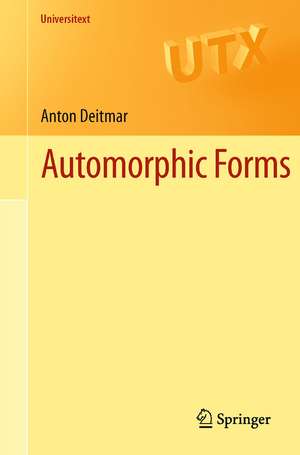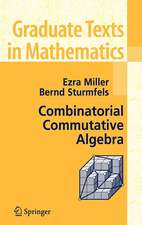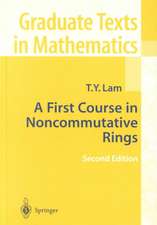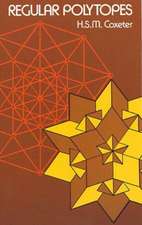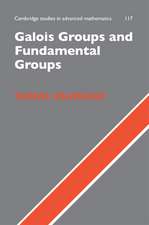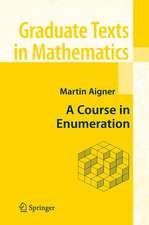Automorphic Forms: Universitext
Autor Anton Deitmaren Limba Engleză Paperback – 29 aug 2012
Din seria Universitext
- 13%
 Preț: 353.49 lei
Preț: 353.49 lei -
 Preț: 487.96 lei
Preț: 487.96 lei - 15%
 Preț: 543.75 lei
Preț: 543.75 lei -
 Preț: 418.67 lei
Preț: 418.67 lei - 20%
 Preț: 628.22 lei
Preț: 628.22 lei -
 Preț: 322.62 lei
Preț: 322.62 lei - 17%
 Preț: 364.82 lei
Preț: 364.82 lei -
 Preț: 634.38 lei
Preț: 634.38 lei - 17%
 Preț: 427.32 lei
Preț: 427.32 lei - 13%
 Preț: 355.52 lei
Preț: 355.52 lei - 17%
 Preț: 431.50 lei
Preț: 431.50 lei - 19%
 Preț: 429.21 lei
Preț: 429.21 lei - 19%
 Preț: 393.81 lei
Preț: 393.81 lei -
 Preț: 360.08 lei
Preț: 360.08 lei -
 Preț: 358.44 lei
Preț: 358.44 lei - 13%
 Preț: 389.95 lei
Preț: 389.95 lei -
 Preț: 465.61 lei
Preț: 465.61 lei -
 Preț: 371.99 lei
Preț: 371.99 lei - 15%
 Preț: 497.22 lei
Preț: 497.22 lei - 15%
 Preț: 737.46 lei
Preț: 737.46 lei - 17%
 Preț: 394.41 lei
Preț: 394.41 lei - 15%
 Preț: 509.58 lei
Preț: 509.58 lei - 17%
 Preț: 427.68 lei
Preț: 427.68 lei - 8%
 Preț: 495.44 lei
Preț: 495.44 lei - 17%
 Preț: 364.57 lei
Preț: 364.57 lei - 17%
 Preț: 368.15 lei
Preț: 368.15 lei -
 Preț: 396.55 lei
Preț: 396.55 lei - 15%
 Preț: 553.33 lei
Preț: 553.33 lei - 17%
 Preț: 365.35 lei
Preț: 365.35 lei -
 Preț: 356.78 lei
Preț: 356.78 lei -
 Preț: 673.45 lei
Preț: 673.45 lei - 17%
 Preț: 426.76 lei
Preț: 426.76 lei - 20%
 Preț: 569.56 lei
Preț: 569.56 lei -
 Preț: 372.87 lei
Preț: 372.87 lei -
 Preț: 319.07 lei
Preț: 319.07 lei -
 Preț: 379.86 lei
Preț: 379.86 lei -
 Preț: 445.88 lei
Preț: 445.88 lei -
 Preț: 382.36 lei
Preț: 382.36 lei - 15%
 Preț: 533.72 lei
Preț: 533.72 lei - 15%
 Preț: 496.02 lei
Preț: 496.02 lei - 15%
 Preț: 474.82 lei
Preț: 474.82 lei -
 Preț: 389.70 lei
Preț: 389.70 lei -
 Preț: 484.08 lei
Preț: 484.08 lei - 15%
 Preț: 643.48 lei
Preț: 643.48 lei -
 Preț: 415.02 lei
Preț: 415.02 lei - 15%
 Preț: 602.25 lei
Preț: 602.25 lei - 20%
 Preț: 510.24 lei
Preț: 510.24 lei - 15%
 Preț: 588.37 lei
Preț: 588.37 lei -
 Preț: 381.59 lei
Preț: 381.59 lei
Preț: 469.41 lei
Preț vechi: 552.25 lei
-15% Nou
Puncte Express: 704
Preț estimativ în valută:
89.82€ • 96.05$ • 74.89£
89.82€ • 96.05$ • 74.89£
Carte tipărită la comandă
Livrare economică 18 aprilie-02 mai
Preluare comenzi: 021 569.72.76
Specificații
ISBN-13: 9781447144342
ISBN-10: 1447144341
Pagini: 264
Ilustrații: IX, 252 p. 2 illus.
Dimensiuni: 155 x 235 x 14 mm
Greutate: 0.37 kg
Ediția:2012
Editura: SPRINGER LONDON
Colecția Springer
Seria Universitext
Locul publicării:London, United Kingdom
ISBN-10: 1447144341
Pagini: 264
Ilustrații: IX, 252 p. 2 illus.
Dimensiuni: 155 x 235 x 14 mm
Greutate: 0.37 kg
Ediția:2012
Editura: SPRINGER LONDON
Colecția Springer
Seria Universitext
Locul publicării:London, United Kingdom
Public țintă
GraduateCuprins
Doubly periodic functions.-Modular forms for SL2(Z).-Representations of SL2(R).-p-adic numbers.-Adeles and ideles.-Tate’s thesis.-Automorphic representations of GL2(A).-Automorphic L-functions.
Recenzii
From the reviews:
“This book covers, in a readable and clear style, the main aspects of the theory of automorphic forms with minimal prerequisites. … this book would serve very well as a one-semester course on automorphic forms, representations, and L-functions. A short guide to the literature is given, which directs interested readers to more thorough (and demanding) sources. … There are also numerous well-written exercises that develop the material further.” (Dominic A. Lanphier, Mathematical Reviews, July, 2013)
“This book is an elementary introduction to the realm of Automorphic forms. There are many books on Automorphic forms but this is the first book that requires only few pre-requisites and definitely is suitable for advanced undergraduate classes and for graduate students. … I would recommend this book if you are interested in starting learn Automorphic forms or you will give a first course on this subject. The book is very recent, very well-written and presents very nice exercises and remarks.” (Philosophy, Religion and Science Book Reviews, bookinspections.wordpress.com, March, 2013)
“The book under review is an excellent introduction to this part of number theory, geared to graduate students or accelerated and enthusiastic advanced undergraduates … . The book comes equipped with nice exercise sets and a collection of strategically placed ‘Remarks’ which will guide the reader to more advanced sources and provide him a broader and more organic perspective on the field.” (Michael Berg, MAA Reviews, January, 2013)
“This book covers, in a readable and clear style, the main aspects of the theory of automorphic forms with minimal prerequisites. … this book would serve very well as a one-semester course on automorphic forms, representations, and L-functions. A short guide to the literature is given, which directs interested readers to more thorough (and demanding) sources. … There are also numerous well-written exercises that develop the material further.” (Dominic A. Lanphier, Mathematical Reviews, July, 2013)
“This book is an elementary introduction to the realm of Automorphic forms. There are many books on Automorphic forms but this is the first book that requires only few pre-requisites and definitely is suitable for advanced undergraduate classes and for graduate students. … I would recommend this book if you are interested in starting learn Automorphic forms or you will give a first course on this subject. The book is very recent, very well-written and presents very nice exercises and remarks.” (Philosophy, Religion and Science Book Reviews, bookinspections.wordpress.com, March, 2013)
“The book under review is an excellent introduction to this part of number theory, geared to graduate students or accelerated and enthusiastic advanced undergraduates … . The book comes equipped with nice exercise sets and a collection of strategically placed ‘Remarks’ which will guide the reader to more advanced sources and provide him a broader and more organic perspective on the field.” (Michael Berg, MAA Reviews, January, 2013)
Textul de pe ultima copertă
Automorphic forms are an important complex analytic tool in number theory and modern arithmetic geometry. They played for example a vital role in Andrew Wiles's proof of Fermat's Last Theorem.
This text provides a concise introduction to the world of automorphic forms using two approaches: the classic elementary theory and the modern point of view of adeles and representation theory. The reader will learn the important aims and results of the theory by focussing on its essential aspects and restricting it to the 'base field' of rational numbers.
Students interested for example in arithmetic geometry or number theory will find that this book provides an optimal and easily accessible introduction into this topic.
This text provides a concise introduction to the world of automorphic forms using two approaches: the classic elementary theory and the modern point of view of adeles and representation theory. The reader will learn the important aims and results of the theory by focussing on its essential aspects and restricting it to the 'base field' of rational numbers.
Students interested for example in arithmetic geometry or number theory will find that this book provides an optimal and easily accessible introduction into this topic.
Caracteristici
Presents an elementary introduction that requires only few pre-requisites Introduces a host of different techniques such as representation theory, adeles and ideles, and the methods of Tate's thesis Combines the classical and analytical viewpoint and the modern representation-theoretic approach and reveals their interplay Includes supplementary material: sn.pub/extras Includes supplementary material: sn.pub/extras
